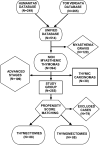Thymomectomy versus complete thymectomy in early-stage non-myasthenic thymomas: a multicentric propensity score-matched study
- PMID: 35723542
- PMCID: PMC9240760
- DOI: 10.1093/icvts/ivac167
Thymomectomy versus complete thymectomy in early-stage non-myasthenic thymomas: a multicentric propensity score-matched study
Abstract
Objectives: Thymomectomy is gaining consensus over complete thymectomy in early-stage thymoma without myasthenia gravis. This is due both to the difficulty of establishing prospective and randomized controlled studies and to the lack of well-defined selection criteria. This bicentric, retrospective propensity score-matched study aims at comparing oncological outcomes, measured in terms of overall survival and thymoma-related survival, in patients undergoing either thymomectomy or complete thymectomy.
Methods: We retrospectively analysed medical records of patients with clinical early-stage (I and II) thymoma undergoing thymomectomy or complete thymectomy. Exclusion criteria were the presence of myasthenia gravis, clinical advanced tumours and thymic carcinoma. A propensity score-matching analysis was applied to reduce potential preoperative selection biases such as comorbidity (Charlson score), tumour maximal diameter and surgical approach (open versus minimal). All variables were dichotomized.
Results: A total of 255 patients were enrolled from 2 different Hospitals, 126 underwent complete thymectomy and 129 a thymomectomy. Disease-free and thymoma-related survivals showed a 5-year rate of 87.7% and 96.0% and a 10-year rate of 82.2% and 91.9%, respectively. Propensity score-matching analysis selected a total of 176 patients equally divided between the 2 groups. No difference was found for both disease-free (P = 0.11) and thymoma-related (P = 0.37) survival in the 2 groups of resection. Multivariable Cox regression analysis showed that histology (P < 0.001), residual disease (P < 0.001) and adjuvant chemotherapy (P < 0.001) were the only predictors of shorter disease-free survival. Whereas there was no evidence to confirm that disease-free and thymoma-related survivals were influenced by resection extent.
Conclusions: Thymomectomy is an adequate surgical resection for non-myasthenic thymoma, achieving disease-free and thymoma-related survivals comparable to those after complete thymectomy.
Keywords: Complete thymectomy; Myasthenia gravis; Surgery; Thymoma; Thymomectomy.
© The Author(s) 2022. Published by Oxford University Press on behalf of the European Association for Cardio-Thoracic Surgery.
Figures
References
-
- Girard N, Ruffini E, Marx A, Faivre-Finn C, Peters S; ESMO Guidelines Committee. Thymic epithelial tumours: ESMO Clinical Practice Guidelines for diagnosis, treatment and follow-up. Ann. Oncol 2015;26:v40–v55. - PubMed
-
- Falkson CB, Bezjak A; Lung Cancer Disease Site Group of Cancer Care Ontario's Program in Evidence-Based Care. The management of thymoma: a systematic review and practice guideline. Ann Thorac Surg 2008;86:673–84. - PubMed
-
- Toker A, Sonett J, Zielinski M, Rea F, Tomulescu V, Detterbeck FC.. Standard terms, definitions, and policies for minimally invasive resection of thymoma. J Thorac Oncol 2011;6:S1739–S1742. - PubMed
-
- Onuki T, Ishikawa S, Iguchi K, Goto Y, Sakai M, Inagaki M. et al. Limited thymectomy for stage I or II thymomas. Lung Cancer 2010;68:460–5. - PubMed
-
- Narm KS, Lee CY, Do YW, Jung HS, Byun GE, Lee JG. et al.; Korea Association for Research on the Thymus. Limited thymectomy as a potential alternative treatment option for early-stage thymoma: a multi-institutional propensity-matched study. Lung Cancer 2016;101:22–7. - PubMed
MeSH terms
LinkOut - more resources
Full Text Sources
Medical





